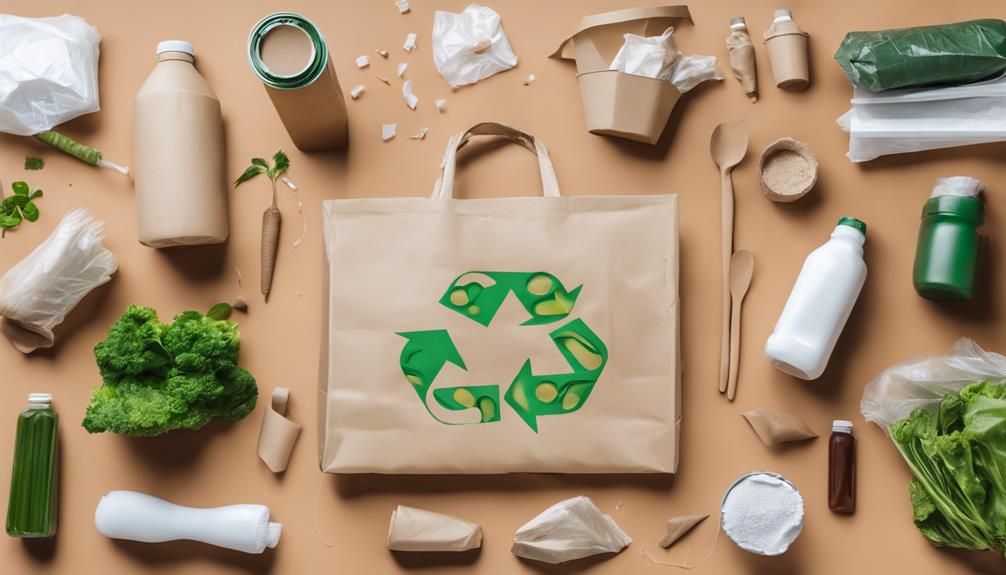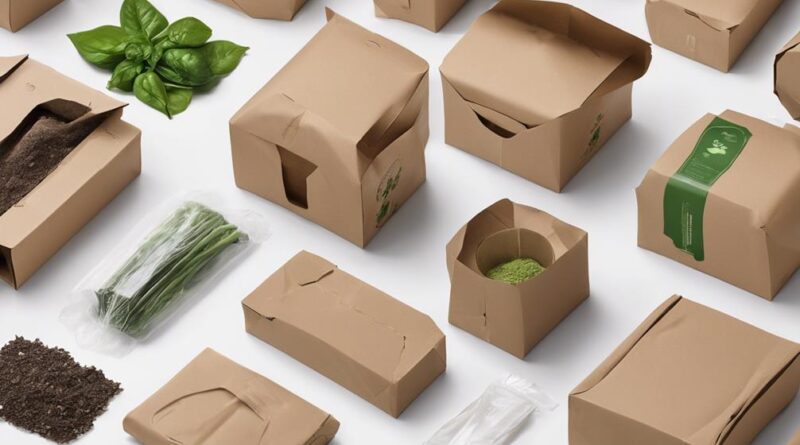Compliant Materials for Organic Food Packaging Explained
When considering compliant materials for organic food packaging, opt for eco-friendly options like plant-based alternatives (cornstarch, sugarcane) and compostable films (cellulose, starch). Sustainable choices such as recycled paper, bioplastics, and eco-friendly paper sourced sustainably are great for reducing waste. Prioritize non-toxic solutions like biodegradable plastics from plant-based sources for food safety. Innovative packaging solutions aim to minimize material usage while protecting products effectively. Remember, aligning with stringent standards exceeds consumer expectations for sustainable practices.
Importance of Compliant Packaging
When selecting organic food packaging materials, understanding the importance of compliant packaging is crucial to ensure food safety and uphold organic standards. In today's market trends, consumers are increasingly leaning towards organic products due to concerns about health and environmental impact. As a result, the demand for organic food packaging that aligns with these values has surged. To meet consumer preferences, packaging mustn't only be eco-friendly but also compliant with organic regulations to maintain the integrity of the product.
Market trends indicate a shift towards sustainable and biodegradable packaging materials to reduce waste and environmental harm. Consumers are actively seeking products that not only benefit their health but also contribute positively to the planet. This has led to a rise in the use of materials like compostable plastics, recycled paper, and plant-based packaging. When choosing organic food packaging, it's essential to consider these market trends and select materials that resonate with eco-conscious consumers.
Consumer preferences play a significant role in shaping the landscape of organic food packaging. As awareness grows regarding the detrimental effects of traditional packaging on the environment, consumers are opting for products that come in sustainable packaging. By aligning with consumer preferences for eco-friendly options, businesses can attract a larger customer base and demonstrate their commitment to sustainability. Therefore, selecting compliant packaging materials that meet organic standards while appealing to consumer preferences is key to success in the organic food market.
Organic Food Packaging Regulations
To ensure the integrity of organic products and align with consumer preferences, understanding and adhering to organic food packaging regulations is imperative for businesses in the industry. Organic food safety is a top priority for regulators and consumers alike. Organic food packaging regulations are put in place to guarantee that the organic products remain uncontaminated and maintain their organic integrity throughout the packaging process.
One critical aspect of organic food packaging regulations is packaging certification. This certification ensures that the materials used in the packaging meet the necessary standards to be considered organic. It involves rigorous testing and evaluation to confirm that the packaging materials don't contain any harmful chemicals or substances that could compromise the organic nature of the product. By obtaining packaging certification, businesses can demonstrate their commitment to organic food safety and build trust with consumers who prioritize organic products.
Compliance with organic food packaging regulations isn't just a legal requirement; it's a fundamental part of maintaining the quality and authenticity of organic products. It's essential for businesses to stay informed about the latest regulations and requirements to avoid any potential issues with non-compliance. By following these regulations diligently, businesses can uphold the standards of organic food safety and ensure that consumers receive high-quality organic products that meet their expectations.
Biodegradable Packaging Options
Exploring the diverse range of biodegradable packaging options available in the market reveals innovative solutions for sustainable packaging practices in the organic food industry. When considering biodegradable packaging for organic foods, it's essential to opt for materials that align with environmentally friendly practices.
Here are four compelling options to consider:
- Plant-Based Alternatives: Plant-based packaging materials, such as those made from cornstarch or sugarcane, offer a renewable and compostable option. These alternatives aren't only biodegradable but also help reduce the reliance on traditional plastic packaging.
- Compostable Films: Compostable films derived from natural sources like cellulose or starch provide a transparent and flexible packaging solution. These films break down into organic matter, leaving behind minimal waste and reducing the environmental impact.
- Eco-Friendly Paper Packaging: Utilizing paper packaging sourced from sustainably managed forests or recycled materials presents a biodegradable option. Paper packaging can be easily recycled or composted, making it a popular choice for eco-conscious consumers.
- Biodegradable Plastics: Biodegradable plastics, derived from plant-based sources like corn or algae, offer a durable yet environmentally friendly packaging solution. These plastics break down into natural components over time, reducing the accumulation of plastic waste in landfills and oceans.
Sustainable Packaging Materials
Moving from biodegradable packaging options, the shift towards sustainable packaging materials in the organic food industry highlights a growing emphasis on eco-conscious and long-lasting packaging solutions. Green alternatives are gaining traction as consumers and businesses alike prioritize environmental sustainability. Sustainable packaging materials encompass a wide range of options that are designed to minimize environmental impact throughout their lifecycle.
Eco packaging involves the use of materials like recycled paper, cardboard, and bioplastics made from renewable resources such as corn starch or sugarcane. These materials offer a more sustainable alternative to traditional plastics, which are derived from non-renewable resources and contribute significantly to pollution. By opting for eco-friendly packaging solutions, businesses can reduce their carbon footprint and appeal to environmentally conscious consumers.
One prominent example of sustainable packaging materials is compostable packaging, which breaks down into natural components when disposed of properly. Compostable materials like plant-based plastics or bagasse (sugarcane fiber) offer a biodegradable alternative that can help reduce waste in landfills. Additionally, reusable packaging options, such as glass jars or metal containers, provide long-lasting and eco-friendly solutions that promote sustainability and reduce single-use plastic consumption.
Non-Toxic Packaging Solutions
For a conscientious approach to packaging in the organic food industry, prioritizing non-toxic solutions is essential to ensure consumer safety and environmental sustainability. When selecting materials for organic food packaging, opting for safe alternatives that are chemical-free is crucial.
Here are some considerations to keep in mind:
- Biodegradable Options: Choosing biodegradable packaging materials not only reduces the environmental impact but also ensures that harmful chemicals don't leach into the food products, keeping them safe for consumption.
- Plant-Based Films: Utilizing plant-based films for packaging offers a non-toxic alternative to traditional plastic films. These films are compostable and don't pose a risk of chemical contamination.
- Water-Based Inks: Opt for water-based inks for printing on packaging materials. These inks are free from toxic chemicals like volatile organic compounds (VOCs), making them a safer choice for both consumers and the environment.
- Recyclable Packaging: Embrace recyclable packaging solutions to minimize waste and avoid the potential hazards associated with non-recyclable materials. By opting for recyclable options, you contribute to a more sustainable packaging ecosystem while ensuring the safety of your organic products.
Eco-Friendly Packaging Innovations
To stay at the forefront of sustainable packaging practices in the organic food industry, embracing eco-friendly innovations is key. Green packaging trends are continuously evolving to meet the growing demand for environmentally conscious packaging solutions. One such trend is the use of biodegradable materials like compostable plastics made from plant-based sources such as cornstarch or sugarcane. These materials break down naturally, reducing environmental impact.
Eco-conscious packaging solutions also include recyclable options that can be repurposed into new products, minimizing waste. Recycled paper and cardboard packaging are popular choices due to their ability to be easily recycled and reused. Additionally, some companies are exploring innovative packaging designs that reduce material usage while maintaining product protection.
Another emerging trend in eco-friendly packaging is the use of edible packaging made from natural ingredients like seaweed or rice. These edible wrappers not only reduce waste but also provide a unique and sustainable packaging experience for consumers. Furthermore, advancements in technology have led to the development of smart packaging solutions that help extend the shelf life of organic products, reducing food waste.
Best Practices for Packaging Compliance

Ensuring compliance with packaging regulations is crucial for organic food producers to maintain integrity and sustainability in their packaging practices. To achieve this, there are several best practices that you should consider implementing:
- Prioritize Packaging Sustainability: Embrace eco-friendly materials and designs that reduce the environmental impact of your packaging. Consumers are increasingly drawn to brands that demonstrate a commitment to sustainability.
- Stay Ahead of Market Trends: Keep a pulse on the latest market trends and consumer preferences. Understanding what drives consumer choices can help you tailor your packaging to meet their expectations and stand out in a competitive market.
- Engage in Transparent Design: Clearly communicate information about your packaging materials, sourcing, and disposal instructions. Transparency builds trust with consumers who value knowing the journey of the products they purchase.
- Regular Compliance Audits: Conduct regular audits to ensure that your packaging materials and practices align with current regulations. Staying proactive in compliance not only mitigates risks but also showcases your dedication to responsible packaging practices.
Labeling Requirements for Organic Packaging
Embrace the significance of accurately labeling organic packaging to convey transparency and trust to consumers regarding the authenticity and quality of your products. When it comes to organic packaging, adhering to labeling requirements is essential to maintain the integrity of your brand and ensure compliance with industry standards.
The certification process for organic packaging involves rigorous assessments to guarantee that the materials used meet specific organic standards. This process typically includes evaluating the sourcing of raw materials, production methods, and adherence to organic regulations. Obtaining certification demonstrates your commitment to providing consumers with organic products and can enhance your brand's credibility.
Labeling guidelines play a crucial role in communicating the organic nature of your packaging to consumers. It's essential to clearly display relevant information such as the organic certification logo, the name of the certifying body, and any organic claims in a prominent and easily readable manner. Additionally, including details about the materials used and their organic certification status can help consumers make informed purchasing decisions.
Conclusion
In conclusion, choosing compliant materials for organic food packaging is crucial for meeting regulations, reducing environmental impact, and ensuring consumer safety.
By opting for biodegradable, sustainable, non-toxic, and eco-friendly packaging options, you can enhance the overall sustainability of your product and brand.
It's important to stay informed about best practices and labeling requirements to make informed decisions and contribute to a more sustainable future for the packaging industry.
